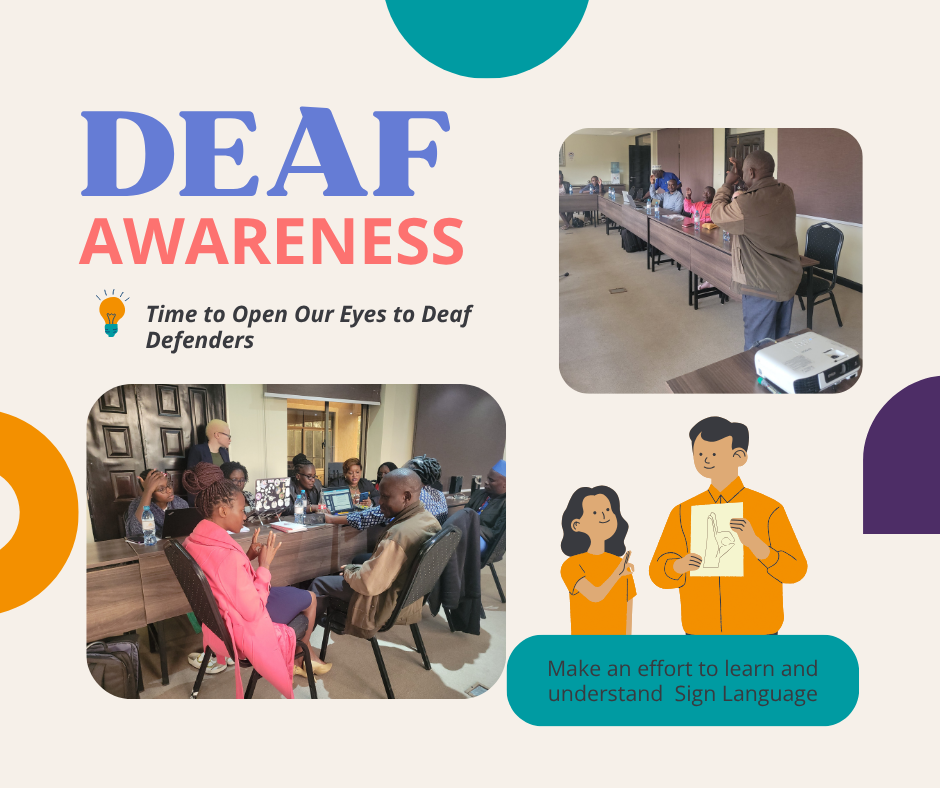The meeting has already begun. Papers shuffle, voices overlap, decisions are being made. In the corner of the room sits a deaf defender—alert, ready to contribute, but excluded. No interpreter has been provided. No captions are available. While colleagues debate the future of human rights protection, their words remain out of reach. The excuse is familiar: “the budget couldn’t stretch to cover an interpreter.” Accessibility is treated as an extra, not a necessity. And once again, the deaf defender is left in silence.
As organizations that work to protect human rights defenders, we often pride ourselves on standing at the side of those most at risk. Yet this Deaf Awareness Month forces us to ask a difficult question: have we truly stood by deaf defenders?
The honest answer is no—not enough. And in admitting this, we see an urgent call to change.
Where we have fallen short
Deaf people are active in defending rights everywhere. They speak up for equality, access to education and healthcare, recognition of sign languages, and for communities that are often silenced. Many also risk their safety defending broader struggles for democracy, women’s rights, disability justice, and LGBTQ+ equality.
Yet when these defenders need protection, our systems often fail them. Too many of our hotlines are voice-only. Too many shelters are unprepared to communicate in sign language. Too many emergency funds use application forms that are not disability friendly. Too many of our staff are untrained in engaging with deaf culture. And too often, accessibility is dismissed as “too expensive,” as if an interpreter or captioning service were an optional luxury rather than a basic right.
We say we are inclusive—but in practice, we have designed protection mechanisms as if “human rights defender” means “hearing.” That is not inclusion. That is exclusion.
The hidden risks we overlook
In our work, we see threats, harassment, and violence against defenders every day. But do we see the invisible barriers deaf defenders face?
- Being told to leave a school or workplace because no interpreters are available—and no budget is set aside to provide one.
- Being excluded from meetings where decisions are made because no one can sign.
- Being denied legal redress because justice systems claim interpreter costs are “beyond their resources.”
- Being doubly stigmatized if they are also women, LGBTQ+, or members of minority groups.
These are not just inconveniences. They are risks. They push deaf defenders further into vulnerability while leaving them without the safety nets we promise to all defenders.
Why we must change
This is not about charity. It is about rights. The UN Convention on the Rights of Persons with Disabilities makes accessibility, participation, and recognition of sign languages clear obligations. It does not say “if resources allow.”
As organizations that work to defend human rights defenders, we must hold ourselves to the same standard we demand from states. If we exclude deaf defenders because we consider accessibility an “extra cost,” we betray the very principles we exist to uphold.
What we must do—starting now:
- Make our hotlines, shelters, and emergency funds fully accessible, with interpreters, captions, and user-friendly processes. Accessibility costs must be seen as core budget lines, not add-ons.
- Partner with and fund deaf-led initiatives to design protection solutions that work in practice.
- Train our teams to understand deaf culture and to communicate inclusively.
- Embed recognition of sign languages as part of our human rights protection systems.
Awakening this Deaf Awareness Month
This Deaf Awareness Month is a wake-up call. For too long, deaf defenders have been overlooked—unseen within our networks, unprotected in our systems, and unheard in our strategies.If we are truly committed to defending human rights, then no defender can be left behind. Deaf defenders are not “others.” They are us. They are part of the same global fight for dignity, equality, and freedom.
It is time for us—and all organizations like us—to open our eyes, to change our practices, and to ensure that every defender, deaf or hearing, can count on our protection. Because protecting human rights defenders means protecting all defenders.
Perpetua Senkoro


